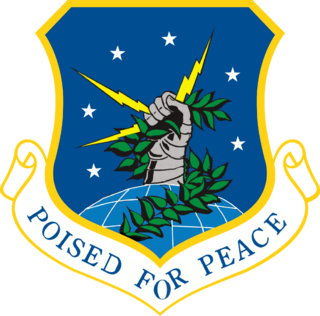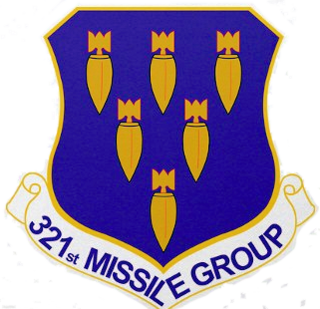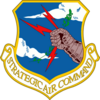
The LGM-30 Minuteman is an American land-based intercontinental ballistic missile (ICBM) in service with the Air Force Global Strike Command. As of 2024, the LGM-30G is the only land-based ICBM in service in the United States and represents the land leg of the U.S. nuclear triad, along with the Trident II submarine-launched ballistic missile (SLBM) and nuclear weapons carried by long-range strategic bombers.

Ellsworth Air Force Base (AFB) is a United States Air Force (USAF) base located about 10 miles (16 km) northeast of Rapid City, South Dakota, just north of the town of Box Elder.

The Minuteman Missile National Historic Site is an American national historic site established in 1999 near Wall, South Dakota, to illustrate the history and significance of the Cold War, the nuclear arms race, and intercontinental ballistic missile (ICBM) development. The site preserves the last intact Minuteman II ICBM system in the United States, in a disarmed and demilitarized status. Guided tours are available of the underground Launch Control Center, and a missile silo can be observed from above. Some 450 of the newer Minuteman III missiles are still on active duty at Malmstrom AFB, Montana, Minot AFB, North Dakota, and F. E. Warren AFB, Wyoming.

The 44th Missile Wing is an inactive United States Air Force unit. Its last assignment was with Twentieth Air Force, being assigned to Ellsworth AFB, South Dakota. It was inactivated on 4 July 1994.

The 351st Missile Wing is an inactive United States Air Force unit, which was last based at Whiteman Air Force Base, Missouri. Assigned to Strategic Air Command for most of its existence, the wing maintained LGM-30F Minuteman II ICBMs in a state of readiness to fire, pursuant to any launch orders that might be received from the National Command Authority. It was inactivated in 1995.

The 321st Air Expeditionary Wing was a United States Air Force unit assigned United States Air Forces Central, the USAF component command of United States Central Command. The unit was reestablished on 1 November 2008 and was a nexus of all Coalition Air Force Training Teams and the Iraqi Air Force at COB Speicher. It was previously the 321st Bombardment Group (Medium), which flew B-25 Mitchells in combat with the Northwest African Strategic Air Force in 1943 and the Mediterranean Allied Tactical Air Force in 1944–45.

The 66th Missile Squadron is an inactive United States Air Force unit. It was last assigned to the 44th Operations Group, stationed at Ellsworth Air Force Base, South Dakota. The 66th was equipped with the LGM-30F Minuteman II Intercontinental ballistic missile, with a mission of nuclear deterrence. With the end of the Cold War, the 66th was inactivated on 1 September 1993. Number of flights 100

The 448th Missile Squadron is an inactive United States Air Force unit. It was last assigned to the 321st Missile Group at Grand Forks Air Force Base, North Dakota, where it was equipped with the LGM-30G Minuteman III Intercontinental ballistic missile (ICBM), with a mission of nuclear deterrence.

The 67th Missile Squadron is an inactive United States Air Force unit. It was last assigned to the 44th Operations Group, stationed at Ellsworth Air Force Base, South Dakota.

The 68th Missile Squadron is an inactive United States Air Force unit. It was last assigned to the 44th Operations Group, stationed at Ellsworth AFB, South Dakota.

The Airborne Launch Control System (ALCS) provides a survivable launch capability for the United States Air Force's LGM-30G Minuteman III intercontinental ballistic missile (ICBM) force. The ALCS is operated by airborne missileers from Air Force Global Strike Command's (AFGSC) 625th Strategic Operations Squadron (STOS) and United States Strategic Command (USSTRATCOM). The system is located on board the United States Navy's E-6B Mercury, which serves as USSTRATCOM's "Looking Glass" Airborne Command Post (ABNCP). The ALCS crew is integrated into the ABNCP battle staff and is on alert around the clock.

Airborne Launch Control Centers provide a survivable launch capability for the United States Air Force's LGM-30 Minuteman Intercontinental Ballistic Missile (ICBM) force by utilizing the Airborne Launch Control System (ALCS) on board which is operated by an airborne missileer crew. Historically, from 1967–1998, the ALCC mission was performed by United States Air Force Boeing EC-135 command post aircraft. This included EC-135A, EC-135C, EC-135G, and EC-135L aircraft.

The 446th Missile Squadron is an inactive United States Air Force unit. It was last assigned to the 321st Missile Group, stationed at Grand Forks AFB, North Dakota

The 447th Missile Squadron is an inactive United States Air Force unit. It was last assigned to the 321st Missile Group, stationed at Grand Forks AFB, North Dakota

This is a list of the LGM-30 Minuteman missile alert and launch facilities of the 90th Missile Wing, 20th Air Force, assigned to Francis E. Warren Air Force Base, Wyoming.

This is a list of the LGM-30 Minuteman missile Missile Alert Facilities and Launch Facilities of the 91st Missile Wing, 20th Air Force, assigned to Minot AFB, North Dakota.
This is a list of the LGM-30 Minuteman missile Missile Alert Facilities and Launch Facilities of the 341st Missile Wing, 20th Air Force, located at Malmstrom AFB, Montana.

This is a list of the LGM-30 Minuteman missile Missile Alert Facilities and Launch Facilities of the 321st Missile Wing, 20th Air Force, assigned to Grand Forks AFB, North Dakota.

This is a list of the LGM-30 Minuteman missile Missile Alert Facilities and Launch Facilities of the 351st Strategic Missile Wing, 20th Air Force, assigned to Whiteman AFB, Missouri.

Francis E. Warren Air Force Base, shortened as F.E. Warren AFB is a United States Air Force base (AFB) located approximately 3 miles (4.8 km) west of Cheyenne, Wyoming. It is one of three strategic-missile bases in the U.S. It was named in honor of Francis E. Warren in 1930. Warren AFB is home of the 90th Missile Wing, assigned to the Twentieth Air Force, Air Force Global Strike Command. The 90 MW operates the LGM-30G Minuteman III ICBM. It is also the home of Twentieth Air Force, which commands all U.S. Air Force ICBMs.


























